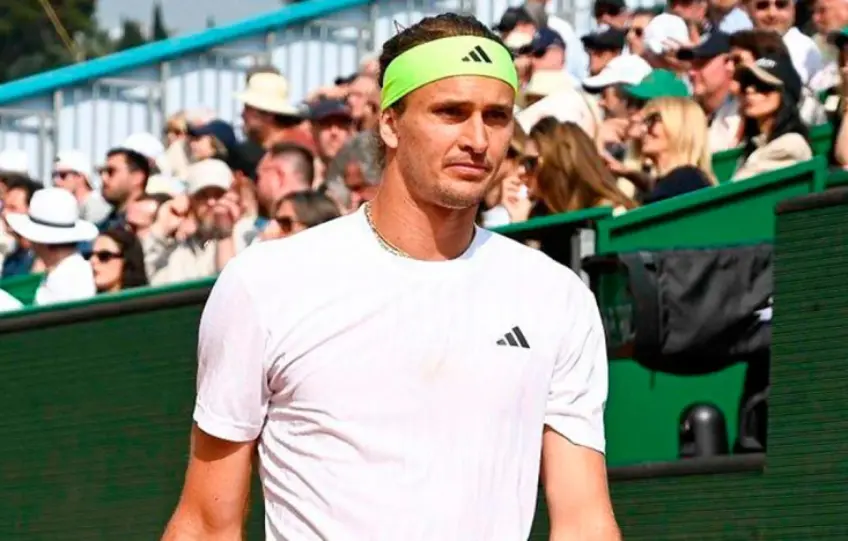
The sun-drenched clay courts of Monte Carlo, usually a stage for triumph and tenacity, became the latest scene of frustration for Alexander Zverev on Tuesday. The World No. 2, a towering figure in men’s tennis with a game built on precision and power, suffered a stinging defeat in his opening match at the 2025 Monte Carlo Masters, falling 2-6, 6-3, 7-5 to Matteo Berrettini. What should have been a launching pad for his clay-court season instead turned into a moment of raw self-reckoning, as Zverev unleashed a torrent of criticism—directed not at his opponent, but at himself. The loss, his sixth in 12 matches since a runner-up finish at the Australian Open in January, has plunged the German star into a spiral of doubt, leaving fans and analysts wondering: what’s gone wrong for one of tennis’s brightest talents?
Zverev entered the match as the top seed, a status that carried the weight of expectation after Jannik Sinner’s doping suspension opened a window for him to chase the No. 1 ranking. Monte Carlo, with its picturesque backdrop and storied history, seemed the perfect place to kickstart that ascent. He started strong, seizing the first set with authority, his baseline game humming as he dictated play against the hard-hitting Italian. But the tide turned in the second set, and what followed was a collapse that Zverev himself could barely stomach. “I played a great first set, and once I got broken in the second set, I played 10 levels down,” he admitted, his voice heavy with disappointment. The third set slipped away in a tense 7-5 finish, sealed when Berrettini, a former Wimbledon finalist, broke Zverev’s serve in the 11th game after an epic 48-shot rally and held firm to close it out.
The defeat wasn’t just a stumble—it was a glaring spotlight on a troubling trend. Since his Melbourne heartbreak against Sinner, Zverev has struggled to recapture the form that once made him a Grand Slam contender and Olympic gold medalist. Quarter-final exits in Buenos Aires and Rio, a shock loss to teenager Learner Tien in Acapulco, and early departures in Indian Wells and Miami have painted a picture of a player adrift. Monte Carlo, where he’s reached the semifinals twice before, was supposed to be a turning point. Instead, it became another chapter in what Zverev called “the worst period since my injury” in 2022, when a gruesome ankle tear sidelined him for months. “My level was terrible,” he said bluntly, offering no excuses. “My ball is much slower. I stop hitting the ball. The same story the last few months. Nothing changes.”
For Zverev, the frustration isn’t just about losing—it’s about losing from winning positions. Against Berrettini, he held the upper hand early, only to watch it slip away, a pattern that’s haunted him across continents this year. “It’s a matter that I’m losing. It’s as simple as that,” he confessed, his words laced with a mix of resignation and bewilderment. “I lost three sets in Buenos Aires, I lost three sets in Rio, I lost three sets in Indian Wells, I lost three sets in Miami, I lost three sets here, and I didn’t win a single one.” The stats back up his self-assessment: since the Australian Open, he’s dropped five matches after taking the first set, a stark contrast to the clutch performer who once thrived under pressure.
Berrettini, meanwhile, reveled in the upset. The 28-year-old, who’s battled injuries but boasts a 17-1 clay record over the past year, leaned on his booming forehand and steely resolve to turn the match around. “I wasn’t hitting my forehand and serve like I had in previous days,” he reflected, explaining how he shifted gears to outlast Zverev. The victory, his biggest by ranking since 2021, propelled him into the third round, while Zverev was left to pack his bags and head to Munich for his next shot at redemption.
The German’s woes have broader implications. With Sinner sidelined until Rome, Zverev had a golden chance to close the 2,685-point gap to the top spot. Now, that dream feels further away, and the chasing pack—Carlos Alcaraz, Novak Djokovic, and others—lurks closer in the rearview mirror. At 27, Zverev’s career is far from over, but the clock is ticking on his prime years. “I have not won many matches,” he acknowledged, a stark admission for a player of his caliber. “It’s me who lost the match, once again.”
As the clay season unfolds, Zverev’s next steps will be telling. Munich offers a fresh start on home soil, where he’s won twice before, but the scars of Monte Carlo linger. Can he shake the rust, rediscover his fire, and silence his own harsh critique? For now, the tennis world watches a champion wrestle with himself, his racket a mirror reflecting both his brilliance and his burdens.
Leave a Reply